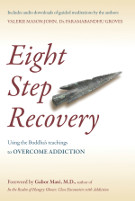Buddhist Recovery Network book review
“Eight Step Recovery: Using the Buddha’s Teachings to Overcome Addiction”
Valerie Mason-John & Paramabandhu Groves
Windhorse Publications, 2014.
ISBN 1909314021, 978-1909314023
Paperback (and Kindle). 248 pages.
School/perspective: Traditional Buddhism and AA
 Order this book online at Amazon
Order this book online at Amazon
Interviews and videos:
Link to an interview with Valerie Mason-John: View here...
And various links to YouTube® videos:
Vimalasara aka Valerie Mason-John - Twelve Steps
Vimalasara aka Valerie Mason-John - The Vicious Cycle
Vimalasara aka Valerie Mason-John - The Four Basic Needs Of The Heart
Contents:
- About the authors
- Acknowledgements
- Audio downloads
- Author's note
- Dedication
- List of figures
- Foreword
- Introduction
- Step One Accepting that this human life will bring suffering
- Step Two Seeing how we create extra suffering in our lives
- Step Three Embracing impermanence to show us that our suffering can end
- Step Four Being willing to step onto the path of recovery and discover freedom
- Step Five Transforming our speech, actions, and livelihood
- Step Six Placing positive values at the centre of our lives
- Step Seven Making every effort to stay on the path of recovery
- Step Eight Helping others by sharing the benefits we have gained
- Tools for recovery
- Notes and references
Testimonials:
“Through Buddhist teachings, personal experiences, and case examples, this book provides a wise illustration of the fundamental processes underlying a broad range of addictive behaviors. MasonJohn and Groves offer here a practical and compassionate step-by-step guide to freedom from the deep trappings and suffering of addiction.”
~ Sarah Bowen, Assistant Professor, Department of Psychiatry and Behavioral Sciences, University of Washington, author of Mindfulness-Based Relapse Prevention for Addictive Behaviors: A Clinician’s Guide
“Blending the MBAR program with traditional Buddhist teachings and personal stories, the authors give us a wise and compassionate approach to recovery from the range of addictions. This comprehensive approach will be a valuable tool for addicts and addiction professionals alike.”
~ Kevin Griffin, author of One Breath at a Time: Buddhism and the Twelve Steps
“The eight steps outlined here provide a simple, wise and practical approach to recovery from a wide range of compulsive patterns of behavior associated with suffering. They provide a spiritual pathway to recovery for people from any faith tradition, as well as for those who are not religious, and for those who suffer from addiction as well as those who are simply aware of the suffering associated with the human condition. This is a book for everyone!”
~ Professor Chris Cook, Director of the Project for Spirituality, Theology & Health, Durham University
Selected excerpts:
“These Eight Steps are aimed at anyone who is struggling with an addiction or compulsive behaviour. As well as drug, alcohol and gambling addictions, the book is for people who experience compulsive or addictive aspects to eating, sex or other behaviours. Although we recognize that recovering from addiction can be a matter of life or death for some people, this book is also for people who do not think of themselves as having an addiction, but who have habits that are harmful in their lives. We hope the book will be of value to professionals working in the field of addiction, as well as those caring for someone with an addiction, or in relationship with a person struggling with addiction.”
“We can’t avoid suffering if we open our eyes to it. Suffering is all around us. However, freedom from suffering is in front of our eyes too. Some of us, who realize our difficult human predicament, reach a crisis and turn to a spiritual path, faith or religion to deal with the shock. Others turn to an addiction for answers to the meaning of life. Fortunately, addiction itself and its suffering can lead people into the doors of a Buddhist temple, a church, a mosque, a synagogue, and many other places that offer some type of solace.”
“Our book draws on the teachings of the Buddha, but the Steps can be used by someone from any religious or spiritual tradition or from none. In the spirit of the Buddha’s advice to some of his disciples, we encourage you to test out the teachings here in your own experience and utilize those you find helpful.”
The Buddhist Recovery Network does not officially endorse any of the book reviews that appear on this site. They are private viewpoints that may or may not represent the views of the organisation or its members. Readers are free to submit book reviews for publication on this site via the link below.
Reviews posted:
-- none --
Review submission
To have a review of this book considered for publication, please email it to contact at buddhistrecovery dot org



 Copyright © 2008-2024 Buddhist Recovery Network
Copyright © 2008-2024 Buddhist Recovery Network